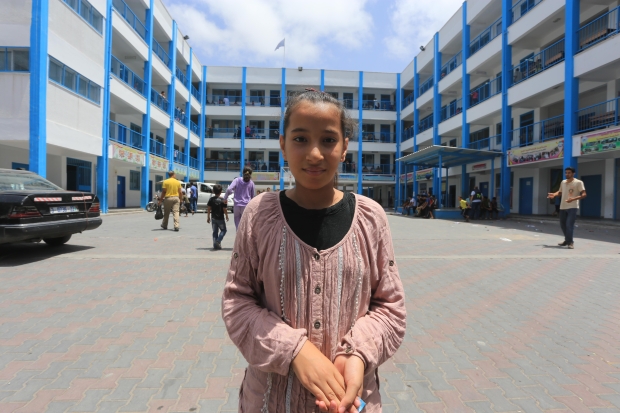Thousands flee northern Gaza as fears of ground invasion heat up

Thousands of Palestinians have fled northern Gaza, after the Israeli military issued warnings that it planned to hit the Strip, Middle East Eye sources in Gaza have said.
Early on Sunday morning, northern Gaza was showered by Israeli army leaflets, informing residents to flee south before noon, local time (10:00 GMT), or risk putting "his and his family's lives at risk. Beware."
Hamas officials have also told people to stay in their homes, and to ignore Israeli warnings.
"We are in contact with all the international organizations and human rights groups operating in Gaza," the Palestinian Interior Ministry in Gaza said in a statement. "Until now there has been no development that requires the evacuation of areas in the north of the strip.
The United Nations Relief and Works Agency for Palestinian refugees (UNRWA) has started opening its schools to provide shelter for the families arriving in Gaza City.
“Israeli air strikes have struck our homes continuously over the past few days, especially overnight,” Mohammed al-Toum, who was fleeing with his family told Middle East Eye.
“The Israeli army sent warning messages to our home phones, telling us that the northern Gaza Strip - including Salateen, Alatatra, and al-Waha, would be targeted. We want to live.”
“I have children…I can’t bear to see them being killed in front of my own eyes.”
Toum and his family, like so many others, have now taken refuge at the makeshift UN shelters, and while they for now have the basic supplies like food and water to cater for the new arrivals, few feel truly safe here.
During Operation Cast Lead in 2008, a UNRWA school was hit by a strike, which according to the UN, killed 42 people, 41 of them civilians. The 22-day operation killed at least 1,400 Palestinians, mostly civilians, and 13 Israelis, mostly military.
“I am afraid of the Israeli army which doesn't spare the old or the young,” 11-year-old Anwar Azam told MEE.
“It strikes with or without warning. It uses lethal weapons. I left home with my family to stay at one of the UNRWA schools after we received warning messages where I live.”
“I don’t think it’s unlikely that the occupation forces (Israeli army) would target this school just like they targeted al-Fakhura school in 2008,” she added.
But not everyone has fled, and Palestinian medical sources told Middle East Eye that hospitals in the north will not be evacuated. Many families have decided to stay and brave the attacks.
It is unclear how long the expected heavy bombing will last, although Israel has said that it expected this part of the operation to be “be brief”.
Israeli Prime Minister Benjamin Netanyahu, however, early Sunday reiterated calls that Israel would “continue operating in Gaza forcefully in order to restore quiet."
"We don't know when operation will end; it might take a long time," he said.
Most observers are now watching the outcome of an Israeli security meeting, taking place later this afternoon, where some fear that a decision for a ground invasion may be taken.
There had been tentative signs overnight of a possible escalation, with further tank deployment to the south, as well as reports emerging that an elite team of Israeli marines had entered Gaza to destroy Hamas rockets. According to Israeli military sources, 33,000 reservists have now been called up from the 40,000 authorised by the Knesset earlier this week.
Mohamed Omer, reporting for MEE from Gaza, however, says that he believes any invasion is likely to be small-scale in nature.
“Everyone in Gaza is waiting for the 6:30pm (16:30 GMT) Israeli cabinet meeting to discuss what is next for Gaza. Tonight is expected to be another violent night with F16 missiles falling on different sides of the city,” he told MEE, while saying that there had been more than 100 airstrikes across Gaza today.
“I don't expect a massive ground invasion. Perhaps a limited one on some areas like Rafah's border with Egypt, and north of Gaza and East Gaza city are possible. The bombing has focused heavily on these areas most of the day.”
Since operation Protective Edge was launched early on Monday, at least 167 people have been killed and more than 1,100 injured in Gaza. Dozens of Israelis have also suffered minor injuries, with a 16 year-old Israeli being hospitalised earlier with "moderate-to-serious injuries," after a Hamas rocket hit his house in Ashkelon, a coastal town bordering the Gaza Strip.
Rockets have continued to fly between Gaza and Israel today, with Hamas hitting several sites in southern Gaza, and aiming long-range missiles at Tel Aviv again, although these were intercepted by the Iron Dome missile defence system.
Despite earlier warnings to evacuate, Israeli strikes have been relatively limited today, although the pattern over the last few days has always seen an escalation of strikes after the sun sets.
Stay informed with MEE's newsletters
Sign up to get the latest alerts, insights and analysis, starting with Turkey Unpacked
Middle East Eye delivers independent and unrivalled coverage and analysis of the Middle East, North Africa and beyond. To learn more about republishing this content and the associated fees, please fill out this form. More about MEE can be found here.






